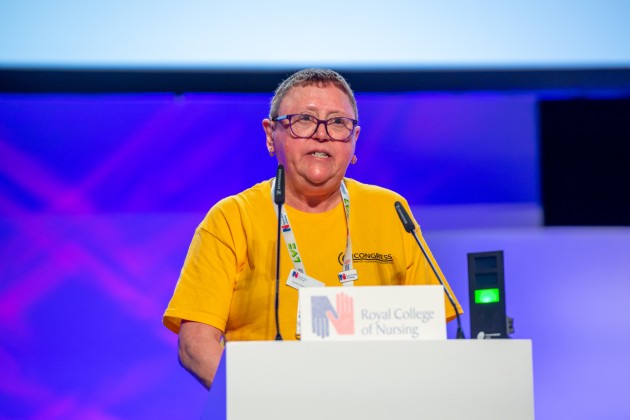There is a perception that discrimination against the LGBTQ+ community is a thing of the past – but the statistics paint a very different picture.
According to Home Office figures for England and Wales, reports of sexual orientation hate crime rose from 4,345 in 2011 to 26,153 in 2022 – an increase of 41%.
“It’s shocking,” says Jason Warriner, RCN International Committee member. “I see people who don’t feel safe walking around holding hands as a same sex couple. I think there was a feeling that the world was a good place for LGBTQ+ people now, but overall in the UK we seem to have stepped backwards. The whole equality, diversity and inclusion agenda appears to have fallen into chaos.”
What is hate crime?
The Metropolitan Police defines hate crime as: “any criminal offence which is perceived by the victim or any other person, to be motivated by hostility or prejudice based on a person's race or perceived race; religion or perceived religion; sexual orientation or perceived sexual orientation; disability or perceived disability and any crime motivated by hostility or prejudice against a person who is transgender or perceived to be transgender.”
Starting conversations
For individuals, the effects can be devastating. “For some, it completely changes their lives,” says Jason. “They can be affected physically, emotionally, and mentally, with some people not feeling safe at home, if the threats are from neighbours. They may also lack the confidence to access the support they need. It can have a massive impact.”
Nursing staff can create the time and space for people to feel they can talk about anything
As ��ͷ������ staff work in so many different settings – from GP surgeries to A&E, hospital wards and the community – they are more than likely to see those who have experienced hate crime or may still be subjected to it. “Nursing staff can have conversations around what happened, creating the time and space for people to feel they can talk about anything,” he says. “They need reassurance that it’s okay to reach out for help.”
Nursing staff may also be victims of hate crime too. “Sadly, within ��ͷ������ there is homophobia and transphobia,” says Jason. “We need to recognise and acknowledge it, so organisations can begin to tackle it.”
Practical skills
On behalf of the RCN Public Health Forum, Jason submitted a resolution to last year’s RCN Congress, which called for RCN Council to help ��ͷ������ staff support members of the LGBTQ+ communities who are victims of hate crime.
The resolution passed and the RCN is now looking at the practical skills and knowledge ��ͷ������ staff need to best support their patients.
How to support your patients
- Be aware of what hate crime is and that it can take many forms.
“It’s generally about unwanted and targeted attention, with hostility – and that can be physical assault, verbal abuse or a combination of both,” says Wendy Irwin, RCN Head of Equality and Diversity. - Know where to signpost people for help.
“Do a quick search to see what’s available in your area – whether that’s the police, local charities or online. If you invest some time in pulling together resources, they will always be of use,” Jason Warriner advises. - Read your organisation’s anti-harassment policies.
“Organisations can set a very distinct tone about the standards of behaviour they expect. These need to be set out very clearly, with a structure about what happens if there is an incident. People need to know that if they do report something, there will be a proper process that leads to change,” says Wendy. - Hone your communication skills so people feel confident disclosing what’s happening.
"Hate crime affects people in many different ways. Showing someone you care and that you'll support them can immediately make a difference," Jason says. - Pay attention to what’s happening around you.
“We can all find ourselves in situations where we see something that’s wrong. What you do in that moment is really important. If it’s safe, try to find a way to support that person, including helping them to report what happened and reporting it yourself,” encourages Wendy.
“We’re thinking about how we can provide support for anyone who’s experienced hate crime, alongside how we can try to prevent it happening in the first place,” says Wendy Irwin, RCN Head of Equality and Diversity. “We’re trying to give ��ͷ������ staff the skills to do something about it.”
We're trying to give ��ͷ������ staff the skills to do something about it
RCN guidance, which will talk about what hate crime involves and how it can potentially happen to anybody, almost anywhere, is currently being written.
“It’s also important to remember that if you witness hate crime, you can report it yourself,” says Wendy. “When someone experiences hate crime, it can make them feel very isolated, so if someone says, I saw that and I’ll stand by you, it’s very powerful.”

Above: Jason Warriner speaking at RCN Congress 2023, in Brighton
There are also plans to host a fringe event at this year’s Congress, involving one of the anti-hate organisations in Wales. Last year, , which sets out a clear vision for making Wales the most LGBTQ+ friendly nation in Europe. During its drafting, RCN Wales was consulted and provided some comments.
- Read next: Five ways to be a good LGBTQ ally
Towards the end of the year, there will also be a conference on equality, diversity, and inclusion, which will include a session on hate crime, including how to respond safely.
“You should never have to apologise for your identity or risk being targeted for hatred, simply for the mere fact of being,” says Wendy.
Find out more
- Explore our professional resources and get involved with the RCN Pride in Nursing campaign.
- Read our publication on caring for lesbian, gay, bisexual or trans clients or patients.








